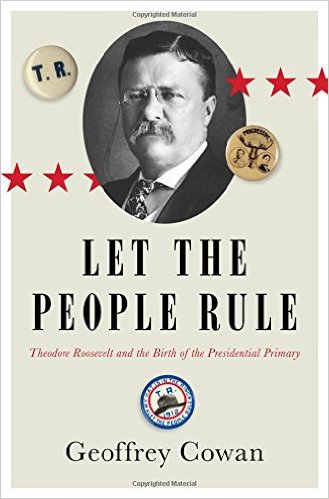By MARTHA MINOW
Review of Let The People Rule: Theodore Roosevelt and the Birth of the Presidential Primary, by Geoffrey Cowan
New York: W. W. Norton & Company, 2016
An internal and nasty fight within the Republican Party; conflict between establishment leaders and populist opinions; unprecedented importance of potential support from African-American voters; raucous and bruising primary fights: The year was 1912, the focus of Geoffrey Cowan's lively and detailed history of Theodore Roosevelt's insurgent effort to reclaim the White House. With the benefit of newly identified archival materials, Cowan traces conflicts over the innovative idea of presidential primaries, and details deal-making, corruption, name-calling and betrayals as Roosevelt battled William Howard Taft, his one-time hand-picked successor and old friend. Besides the sheer action afforded by the vivid narrative and larger-than-life personalities, this book offers obvious parallels with current political fights and illuminates their origins.
Most tellingly, it highlights a key chapter in the ongoing debate: how significant should popular voting be in the selection of presidential candidates and presidents themselves? Roosevelt won 9 out of 13 primaries, but lost the nomination, only to start a new party, divide the electorate, and contribute to the victory of Woodrow Wilson. The creation of a third party did not last, but the narrow range of debate framed by the two dominant pasties has largely endured. The reminder that American political parties ignored or sidestepped the results of presidential primaries between 1912 and 1968 (p. 293) puts the issue Into sharp focus. The book highlights the origin and continuing use by both major parties of methods other than primaries -- notably, party power-brokers-- for selecting some of the convention delegates. This book highlights the origins and operation of such practices even while showing the seeds of populist rhetoric, demanding increasing power for voters.
Another parallel between this historic struggle and the contemporary scene is the investment of media in ensuring and prolonging political contests without improving public knowledge (see pp. 222-223). Unanswered by the history, however, is the critical question whether primaries -- engaging a small number of the electorate -- represent the only or best means for "the people" to "rule." Cowan argues that the primary process, and the populism it entails, eventually made possible the first Catholic president and the first African-American president. He implies that party bosses would never have allowed such developments. But Cowan also quotes Adlai Stevenson, the twice-defeated Democratic presidential nominee, who viewed primaries as expensive, exhausting, and destructive. The vote remains out on this very debate. 104 years have passed, which on one hand suggests the durability of the primary system described in this fascinating book; on the other hand, the book exposes the contingent nature and partly non-rational elements of primaries, governed in a each state by distinctive rules. Although Cowan stresses the primary system as the major legacy of the election of 1912, another lesson is the mutability of the system. Cowan himself placed a direct role in changing the Democratic Party's delegate selection process in 1968. His own example, as well as his well-researched book, point to the ability of individuals to change the rules of democracy.
Posted on 6 June 2016
MARTHA MINOW is the Morgan and Helen Chu Professor of Law and the Dean of Harvard Law School.

